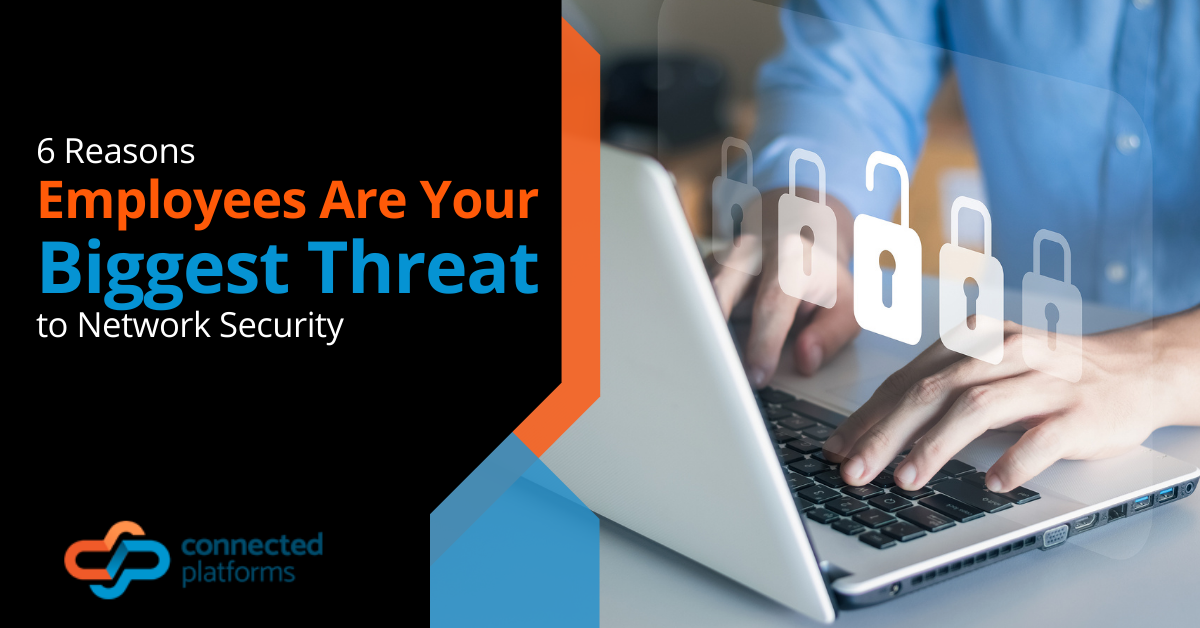Most businesses rely on firewalls, data encryption, and antivirus software as their primary security measures.
Well, that’s the problem in itself. They are all created to prevent cyber thieves from accessing your systems, yet they are ineffective when it comes to the most serious security flaw; human errors.
Don’t Believe? Here Are Statistics to Prove It!
According to studies, organisations are more likely to be infiltrated by an employee misplacing or being duped into passing over important information than by a cyber thief trying to get into their systems.
According to a survey, 60% of respondents believe an employee will breach sensitive data by accident in the coming year.
This is greater than the 46% who anticipate being victims of a cyber-attack, yet organisations continue to invest in engaging expert IT services while ignoring the possibility of insider occurrences.
Below are reasons why employees are your biggest threat to network security:
Insecure Documentation Processes
Printing, distributing, and storing confidential files adds to the already-present security risks to your company.
Printers are so common that many businesses are unaware they pose a security concern. Today’s printers are sophisticated, and many are entirely over-the-network computers, hence vulnerable to cyber-attacks —especially if they are not updated with the most recent security updates and best password practices.
While data theft with printers is a genuine concern, employee behavior when printing is as dangerous. Here are some file-related employee behaviors that might be harmful to your company:
• Being careless about who has access to the company data
• Printing sensitive material and leaving it lying about
• Leaving cabinets unlocked
• Storing papers in several locations, such as paper files and on the business server.
Awareness, policies, and education can all help to change these risky practices. Once business executives understand the document security threats in their firm, the appropriate safeguards can be implemented to avert file loss and hack attacks.
Poor Password Practices
Every organisation (whether big or small) uses various programs to help with company tasks, such as project management tools, accounting software, and email. Each of these software warrants the need for passwords for logins and storage. However, proper password management isn’t usually intuitive; staff must be taught optimal practices for choosing and safeguarding passwords.
Password best practices should include fundamentals like how to generate a safe password, never writing down a password, and changing passwords every few months.
It may not be sufficient just to inform personnel about optimal practices. Go a step further by making password security a workplace policy. Schedule password changes and make them mandatory.
Employees sometimes complain that frequently changing passwords and not being permitted to write them down makes them difficult to remember. If this is the issue at your organisation, you can make use of a password manager to store all of your company’s credentials securely.
Unintentional Disclosure
Humans make mistakes. Whether the issue is with an employee or contractor, confidential data can get exposed. Sometimes the problem is caused by code errors that reveal personal data. Sometimes, an email mistake occurs when the incorrect address or list is selected, and the employee accidentally sends private information.
This unintentional disclosure can lead to very real consequences, such as penalties for violating data protection regulations.
Storing critical information
Employees should never save business or personal information on USBs or external hard drives or print it to take with them outside the workplace. Having that sort of info on a portable device or printed puts it in danger.
It’s quite simple for it to end up in the wrong hands. Ensure you train employees on what personal data they should access, how to keep it, and how to erase it.
Installing unauthorised applications and programs
Daily, dozens of malware programs are posted, which can then be downloaded on a mobile device, a browser extension, or new software. Apps and extensions from reputable sources (such as Google Play Store) are regularly screened to guarantee they are not harmful, although some get through the cracks.
These applications can wreak havoc in the background, doing various things such as stealing data and contaminating other devices on the same network.
Before downloading any app, read the reviews before installing it on your work device. Download software exclusively from official stores, as some harmful apps, masquerade as legitimate apps.
Failure to update software
This is a popular reason hackers can access your networks and devices. System updates are typically performed to improve the program’s usability or design and incorporate new security mechanisms to safeguard it from future attacks.
Employees may be unaware that failing to keep up with system upgrades is unintentionally exposing themselves vulnerable to attacks. To improve online business security, update any software you use regularly. Getting out of this predicament may be costly and complicated.
Get Help Mitigating the Risk of Human Error
While your staff may constitute a security concern, with proper training, you may lessen your chances of being a victim of cybercrime. The main thing is to examine your company, identify any weaknesses, and convey the best methods to all employees.
Connected Platforms is a managed IT service provider serving businesses in and around Brisbane. We offer business IT support and ensure that you have reliable IT systems in place. Contact us to get started!




